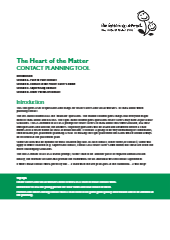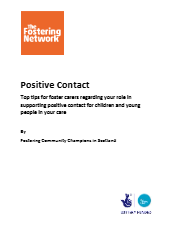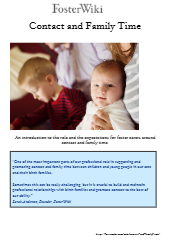Heart of the Matter: Contact Planning Tool
The “Heart of the Matter: Contact Planning Tool” is a comprehensive guide for family time supervisors and social workers to thoughtfully plan contact between children in care and their families. This tool includes sections on face-to-face meetings, contact in foster homes, supervised contact, and alternative forms of communication, addressing key questions for planning safe and meaningful interactions. It encourages collaboration among carers, social workers, and families, with consideration for the child’s safety, emotional needs, and preferences, ensuring contact arrangements are well-supported and adaptable to each child’s situation.

Positive Contact: A Guide for Supervisors
This resource, developed by Fostering Community Champions in Scotland, offers foster carers and other supervisors practical advice for supporting positive contact between children in care and their families. It explores the importance of maintaining family connections for a child’s sense of identity and belonging, including tips on preparing children for visits, supporting them afterward, and handling challenging situations. From sibling visits to maintaining contact with previous carers, this guide provides strategies to help foster carers make contact experiences beneficial and supportive for young people in their care.

Contact and Family Time Guide
The “Contact and Family Time” guide by FosterWiki provides foster carers and other supervisors with insights and guidance on facilitating contact between children in care and their birth families. It covers the importance of contact for maintaining family connections and emotional well-being, while also addressing the practical and emotional challenges foster carers may face. The guide includes details on different forms of contact, such as supervised, unsupervised, and virtual meetings, and emphasises the need for carers to work professionally and empathetically with birth families. This resource highlights the role of carers in supporting safe, meaningful contact while prioritising the child’s best interests and emotional security.

Top Tips for Family Time for Foster Carers
Thisguide offers practical advice to early permanence (EP) foster carers for managing family contact sessions. It includes suggestions like using the child’s initials in communications to maintain confidentiality, dressing children in clothes provided by birth parents to show respect, and bringing familiar toys to provide comfort during family time. The guide highlights the importance of positive handovers, preparing updates to share with parents, and maintaining a separate contact bag with essentials. These strategies aim to support a smooth and respectful family time experience, benefitting both the child and their birth family.

Virtual Family Time/Contact: Fun Activities and Games
The “Virtual Family Time and Contact: Fun Activities and Games Guide” provides creative ideas for making virtual family interactions enjoyable and engaging for children. It includes activities such as pretend tea parties, story creation, guessing games, and virtual hide-and-seek, allowing children and their families to bond despite physical distance. The guide offers a variety of options to suit different age groups and interests, from educational games like trivia and language learning to fun challenges like funny face contests and scavenger hunts. This resource supports positive, meaningful family time through imaginative and interactive virtual experiences.









